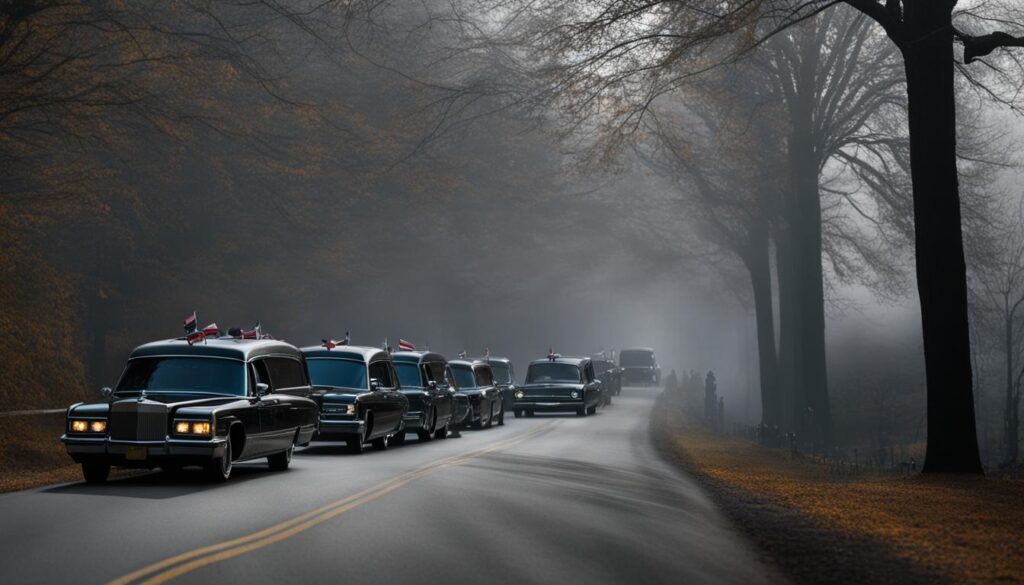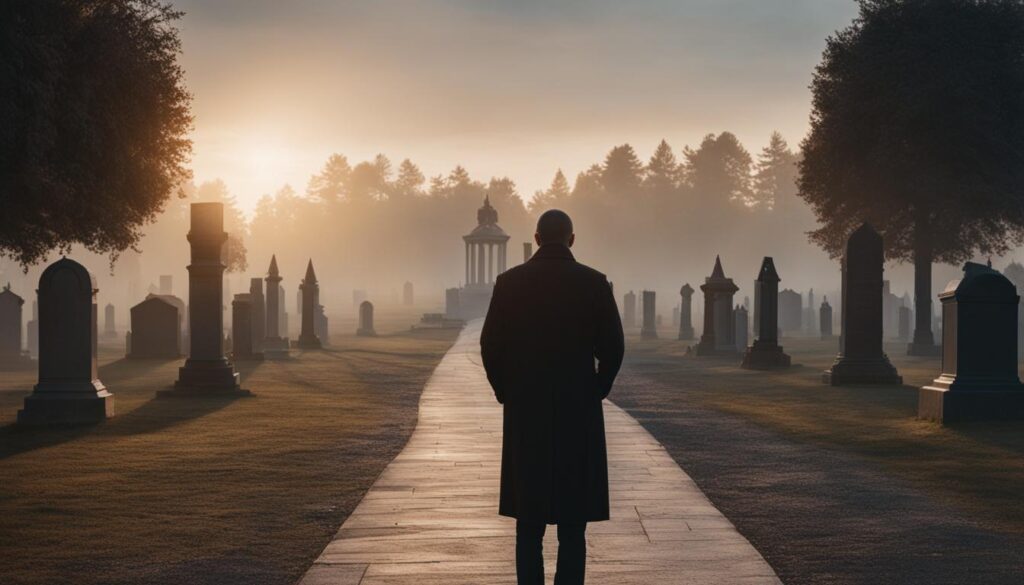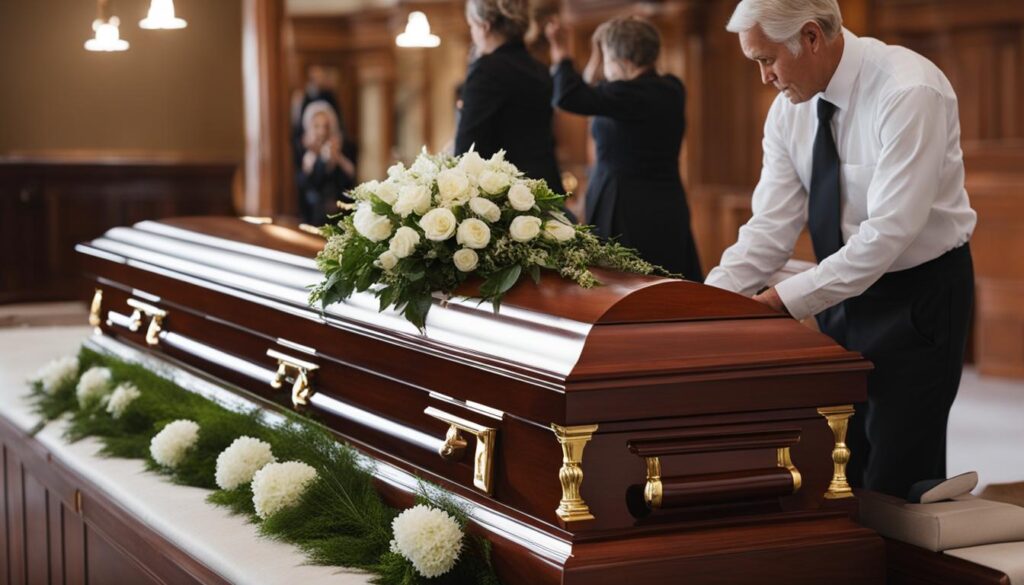We may earn money or products from the companies mentioned in this post.
Funeral procession etiquette is an important aspect of attending a funeral. It involves following certain rules and traditions to show respect and honor to the deceased and their family. Understanding funeral procession traditions is crucial for navigating this solemn event with grace and sensitivity.
Proper funeral procession etiquette involves many aspects, including appropriate behavior during the procession, driving etiquette, and interacting with other drivers on the road. By following these guidelines, attendees can contribute to a smooth and respectful procession, while showing their support for the grieving family.
Key Takeaways
- Funeral procession etiquette is an important aspect of attending a funeral.
- Proper funeral procession etiquette involves following certain rules and traditions to show respect and honor to the deceased and their family.
- Understanding funeral procession traditions is crucial for navigating this solemn event with grace and sensitivity.
- Participants should observe specific rules and practices during the procession, such as driving etiquette and joining the procession.
- Behaving with respect during a funeral procession involves actions such as turning off headlights and refraining from honking.
Why Funeral Procession Etiquette is Important
Proper funeral procession etiquette is essential for honoring the deceased while also displaying respect for their family and loved ones. Following funeral procession guidelines is a way of showing solidarity and support during a difficult and emotional time.
Moreover, adhering to funeral procession protocol is a way of ensuring that the procession moves smoothly and safely, avoiding confusion or accidents on the road. It helps to maintain order and demonstrate the importance of the occasion, setting the right tone for the rest of the funeral proceedings.
Ultimately, the importance of following funeral procession etiquette lies in its ability to show compassion, empathy, and understanding towards those who are grieving. By observing proper behavior during a funeral procession, attendees can offer their condolences while also paying their final respects to the deceased.
Rules and Practices for Funeral Processions
Funeral processions are solemn events that require participants to adhere to specific rules and practices to ensure a respectful atmosphere. Below are some tips for funeral processions:
Joining the Procession
It is customary for family members and close friends to be the first to join the procession. If you are unsure about your place in the procession, it is appropriate to ask the funeral director or family members for guidance. Once you have joined the procession, it is essential to stay in line and follow the car in front of you.
Driving Etiquette
When driving in a funeral procession, it is important to maintain a slow, steady pace. Avoid sudden stops or movements, and stay within the speed limit. It is also customary to turn on your headlights and hazard lights to indicate that you are part of the procession. If you need to change lanes or turn, do so only when necessary and with caution.
Interacting with Other Drivers
During a funeral procession, it is not uncommon to encounter other drivers on the road who may be unfamiliar with the tradition. In this situation, it is important to remain patient and courteous. If another driver attempts to cut into the procession, it is appropriate to gently signal that they should wait until the procession has passed. It is also important to avoid honking or making sudden movements that could disrupt the solemnity of the event.
Following Funeral Procession Protocol
Following funeral procession protocol means respecting the solemnity of the occasion and showing compassion for the bereaved. One example of this is turning off your radio or pausing conversations while in the procession. It is also appropriate to bow your head or offer a silent prayer as the procession passes by. By following these guidelines, you can contribute to a meaningful and respectful funeral procession.
Behaving with Respect During a Funeral Procession
When attending a funeral procession, it is essential to behave with the utmost respect and consideration. The procession is a somber event, and attendees must honor the deceased and their loved ones by demonstrating proper conduct throughout the event.
Here are some guidelines for how to behave during a funeral procession:
-
Follow the procession: If you are joining the funeral procession, make sure to follow the vehicles in front of you. Do not attempt to pass or cut off other participants, as this behavior is disrespectful.
-
Turn off headlights: It is customary to turn off headlights during a funeral procession to demonstrate respect. If you must have your headlights on, ensure that they are low beams and avoid using high beams, as this can be distracting to other drivers on the road.
-
Avoid honking: Honking or sounding your horn during a funeral procession is inappropriate and can be disruptive to those in mourning. Refrain from using your horn for any reason during the procession.
-
Drive cautiously: When participating in a funeral procession, drive slowly and cautiously. Use your turn signals, obey traffic laws, and avoid sudden maneuvers that could cause an accident or disrupt the procession.
-
Be respectful of other drivers: While funeral processions have the right of way, other drivers on the road may not be aware of this fact. Be patient and understanding of other drivers, allowing them to merge or pass as necessary.
By following these guidelines, attendees can show their respect for the deceased and their loved ones, contributing to the solemnity of the procession.
Conclusion: Understanding Funeral Procession Etiquette
Overall, following funeral procession etiquette is crucial for showing respect and honoring the deceased. By joining the procession, turning off headlights, and maintaining a respectful demeanor, attendees can contribute to a meaningful and dignified procession. Proper funeral procession etiquette ensures that everyone involved feels supported and respected during this difficult time.
In conclusion, funeral procession etiquette is an important part of the mourning process. It allows us to come together to mourn and pay our respects, while also showing the utmost respect for the deceased and their loved ones. We hope this guide has provided valuable insights for navigating funeral processions with grace and respect.
Thank you for taking the time to read this guide on funeral procession etiquette.
Funeral Procession Etiquette: Honoring the Deceased with Respect
FAQ
What is funeral procession etiquette?
Funeral procession etiquette refers to the customs and guidelines that dictate proper behavior during a funeral procession. It includes practices such as joining the procession, driving etiquette, and how to interact with other drivers on the road.
Why is funeral procession etiquette important?
Following funeral procession etiquette is important to show respect for the deceased and their grieving loved ones. It helps maintain a solemn and respectful atmosphere during the procession and ensures a smooth flow of traffic for all involved.
What are the rules and practices for funeral processions?
Rules and practices for funeral processions include joining the procession in the correct order, driving with headlights on, maintaining a safe distance, and obeying traffic laws. It is also important to communicate with other drivers on the road to ensure a cohesive and respectful procession.
How should one behave during a funeral procession?
During a funeral procession, it is important to show respect by turning off headlights, refraining from honking, and maintaining a solemn and respectful demeanor. It is also customary to yield to the procession, allowing them to maintain their designated order.
What is the significance of funeral procession etiquette?
Funeral procession etiquette holds significant cultural and emotional importance. It allows mourners to honor the deceased and their grieving loved ones, providing a dignified and respectful farewell. Adhering to funeral procession etiquette helps ensure that the experience remains solemn and meaningful.
Affiliate Disclosure: This post may contain affiliate links. If you purchase through our link, we may receive a small commission, but at no additional cost to you. For more information, please see our Disclosure statement.



